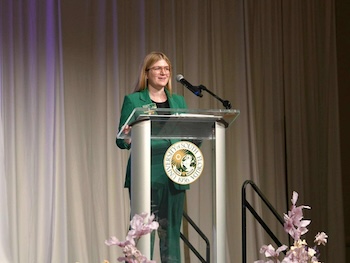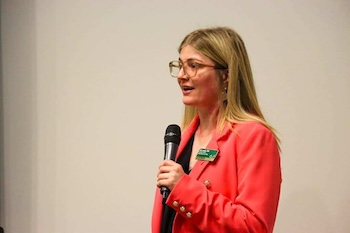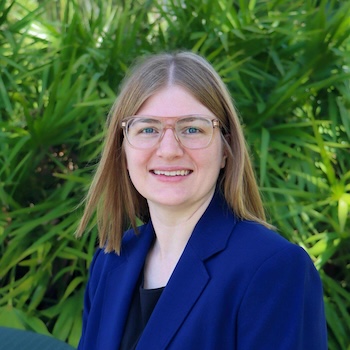I know today’s social and political climate can be particularly brutal, especially if you’re trans. With Scotland’s newly-minted anti-trans Supreme Court rulingexternal link, opens in a new tab, all of the American anti-trans public facility laws, cuts to gender-affirming care, and *gestures at the myriad of bills being pushed through legislation in nearly every direction*external link, opens in a new tab, it might feel impossible to see a future for yourself and your community. How can you feel like there is something worth holding onto in a future that seems more and more bleak each day?

For this exact reason, I reached out to a friend of mine, Dr. Nik M. Lampeexternal link, opens in a new tab. Dr. Lampe is an Assistant Professor of Mental Health Law & Policy at the University of South Florida and their research program focuses on “the behavioral health and healthcare of LGBTQIA+ aging populations.”
If you’re a theater kid like me, you might know why this phrase immediately launched me into the climactic argument during Matthew Lopez’ play “The Inheritance: Part 2,”external link, opens in a new tab where two of the leads (Jasper and Henry) verbally spar over the latter’s right to exist as a conservative gay man. As the tensions rise, and Jasper insinuates that people of Henry’s generation don’t understand the plight of queer men and their communities today, Henry screams, “THERE ARE NO GAY MEN MY AGE! … Not nearly enough.” When that line erupts from his mouth, there is a pregnant pause in every theater it is performed in where every audience member can hear the deafening silence of millions of voices that were snuffed out by the HIV/AIDS epidemic of the 1980s and specifically the United States’ lack of responseexternal link, opens in a new tab to protect them.
The FX Network show “Pose”external link, opens in a new tab — focused on ballroom cultureexternal link, opens in a new tab and its importance for queer and trans people of color during the height of the HIV/AIDS crisis in 1987 — discusses a historical reality that often gets left behind in most depictions of the 1980s. We are all keenly aware that the HIV/AIDS crisis has decimated the gay population (side trivia: why the “L” is first in LGBTQIA+external link, opens in a new tab), but rarely do the stories of trans and queer people of color make it into mainstream media or even history books. Henry from “The Inheritance” is heartbroken by the lack of gay men his age as we all are, but we also can’t ignore that there is a substantial population of trans humans that also did not get to see the privilege of old age. The discussion is as heart-wrenching as it is poignant, but it reminds us of our community’s painful history within this country. Our past, however important and influential it may be, does not necessarily equate our inevitable destiny, though.

How beautiful is it that we, against all odds, have come to a point in history where people are studying aging populations of queer folks? Since the introduction of Queer Theoryexternal link, opens in a new tab in the 1990s, humans who have been largely ignored in scientific communities are finally being involved in and sought after for studies to showcase the effects of our experiences in older adulthood. There is no way to address the historical trans experience without making note of the severe repercussions that perpetual political hostility has on the mental health of trans and nonbinary people. In spite of that, though, Dr. Lampe’s current research asserts that identity and community alone can be enough to create fulfilling trans existences among trans older adults (i.e., adults aged 65+).
They shared details about their recently published study in the American Journal of Public Healthexternal link, opens in a new tab:
[The participants in the study] defined being trans as a positive and satisfying way of aging – by explaining how ‘coming out’ or otherwise ‘becoming or living as trans’ was necessary for them to have a life worth living. Respondents explained how they continue to publicly disclose their gender identities and transition as a means of improving their mental health. Many described their trans experiences as ‘life-saving,’ ‘transformative,’ ‘necessary,’ and even ‘sacred’.
Regarding scientific critiques of the medical model of transgender identity — a frequent debate about whether only medical transition makes trans people “truly” transgender, for example — Dr. Lampe said, “I wish more people understood that access to gender-affirming hormone therapies does not make you any more or less trans. There is no right or wrong way to transition. Personal autonomy and identity are more important than anything else.” They noted that prior studies suggested only about half ofexternal link, opens in a new tab trans adults ever medically or surgically transition. They continued, “Being out, or a part of the community in any way — watching movies, collecting in groups, being active in online forums — is a form of resistance. We create ‘chosen family’ that can fill in the caregiver support gaps [and] we do that without even knowing! It creates something called a ‘protective factor’external link, opens in a new tab that can help reduce — or even eliminate — health disparities.”
I bring this up not to dissuade you from ever wanting to medically transition at some point in your life nor to make light of the very real threat that gender-affirming care could be (or has been) legislated away from you during the course of your lifetime, especially dependent on your geography. Dr. Lampe’s research explicitly states that gender-affirming care helps curb the negative effects of mental health problems in trans communities and that access to it should be an absolute right. It also, though, states that no matter where you are in your trans identity or journey, there are ways to maintain and protect your mental health during this uptick of anti-LGBTQ+ and anti-trans legislation. Neither debates nor laws can take that away from you.

The participants that Dr. Lampe worked with often transitioned before medical/surgical transitioning was even feasible for the average American. In fact, gender-nonconforming humans have always been a part of the social zeitgeist. In Ireland, Dr. James Barryexternal link, opens in a new tab lived and practiced medicine as a trans man in the late 18th to early 19th centuries. Before that, the existence and acceptance of two-spirit folks endured among Indigenous people long before Europeans ever set foot on Turtle Island. Muxeexternal link, opens in a new tab communities in Mexico have long outlived our current political administration, and Samoan and other Polynesian cultures have had fa’afafine and fa’atamaexternal link, opens in a new tab people ingrained in their histories since the dawn of storytelling.
Queer and trans folks have always existed. Queer and trans humans will always continue to exist. No matter what legislation is pushed through Congress; no matter what medical, legal, or administrative access is revoked or granted; no matter what epidemic (biological or social) threatens us, people just like you have existed since the dawn of time and no political movement will ever take that away from you.
